
Giorgia Di Capua (Ph.D.)
@giorgiadc.bsky.social
Climate scientist working at @pik-potsdam.bsky.social
https://www.pik-potsdam.de/members/dicapua/homepage
Looking at climate and weather extremes, atmospheric teleconnections and tropical - extratropical pathways. Views are my own.
https://www.pik-potsdam.de/members/dicapua/homepage
Looking at climate and weather extremes, atmospheric teleconnections and tropical - extratropical pathways. Views are my own.
Pinned

I always loved snow, but recently it has become for me a symbol of hope, that all is not lost
Looking for research on weather extremes in the Mediterranean? Check out our PREVENT-Improved Predictability Of Extremes Over The Mediterranean From Seasonal To Decadal Timescales HORIZON project 🌦️☀️
preventmed-climate.eu
@pik-potsdam.bsky.social is leading WP5-Environmental and socioeconomic impacts
preventmed-climate.eu
@pik-potsdam.bsky.social is leading WP5-Environmental and socioeconomic impacts
Prevent Climate
preventmed-climate.eu
June 19, 2025 at 12:15 PM
Looking for research on weather extremes in the Mediterranean? Check out our PREVENT-Improved Predictability Of Extremes Over The Mediterranean From Seasonal To Decadal Timescales HORIZON project 🌦️☀️
preventmed-climate.eu
@pik-potsdam.bsky.social is leading WP5-Environmental and socioeconomic impacts
preventmed-climate.eu
@pik-potsdam.bsky.social is leading WP5-Environmental and socioeconomic impacts
Reposted by Giorgia Di Capua (Ph.D.)
This Spring (March-April-May) may end up being the driest on record for the UK.
This would also make it the driest of any season in a dataset that goes back to 1836.
Spring in 1852 currently holds the record for driest season at 100.7 mm averaged across the UK.
www.bbc.co.uk/weather/arti...
This would also make it the driest of any season in a dataset that goes back to 1836.
Spring in 1852 currently holds the record for driest season at 100.7 mm averaged across the UK.
www.bbc.co.uk/weather/arti...
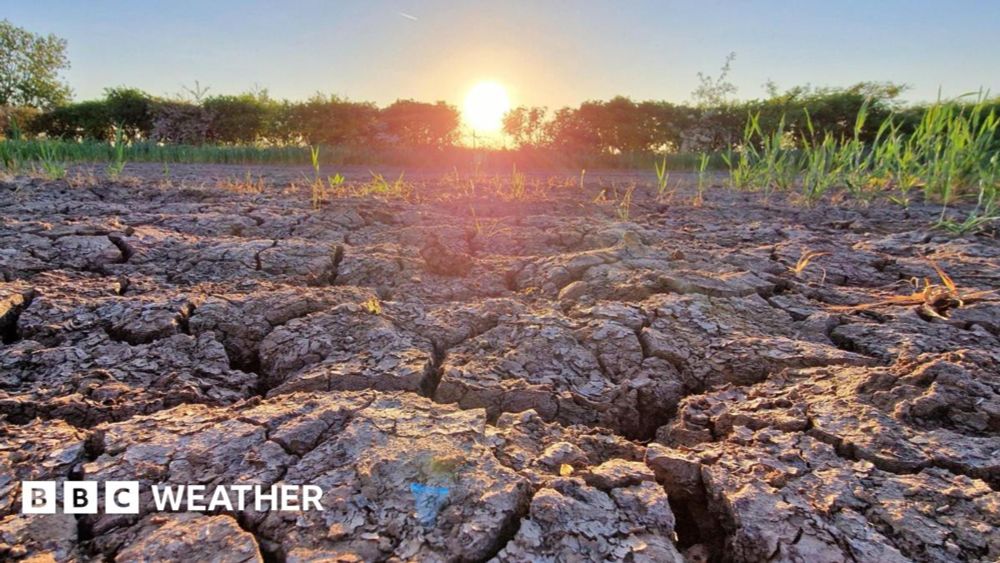
UK weather: Spring may become driest on record with no rain in sight
There has been a lack of rainfall in many parts of the UK so far this spring and there is little or no rain in the immediate forecast.
www.bbc.co.uk
May 13, 2025 at 3:17 PM
This Spring (March-April-May) may end up being the driest on record for the UK.
This would also make it the driest of any season in a dataset that goes back to 1836.
Spring in 1852 currently holds the record for driest season at 100.7 mm averaged across the UK.
www.bbc.co.uk/weather/arti...
This would also make it the driest of any season in a dataset that goes back to 1836.
Spring in 1852 currently holds the record for driest season at 100.7 mm averaged across the UK.
www.bbc.co.uk/weather/arti...
Reposted by Giorgia Di Capua (Ph.D.)
Per i nostri follower italiani: la scienziata del PIK @giorgiadc.bsky.social spiega perché non è troppo tardi per stabilizzare il riscaldamento globale. Fino a 2°C le conseguenze sarebbero più o meno prevedibili, ma oltre, ad esempio a 4°C, l’impatto è incerto.
www1.wdr.de/radio/cosmo/...
www1.wdr.de/radio/cosmo/...
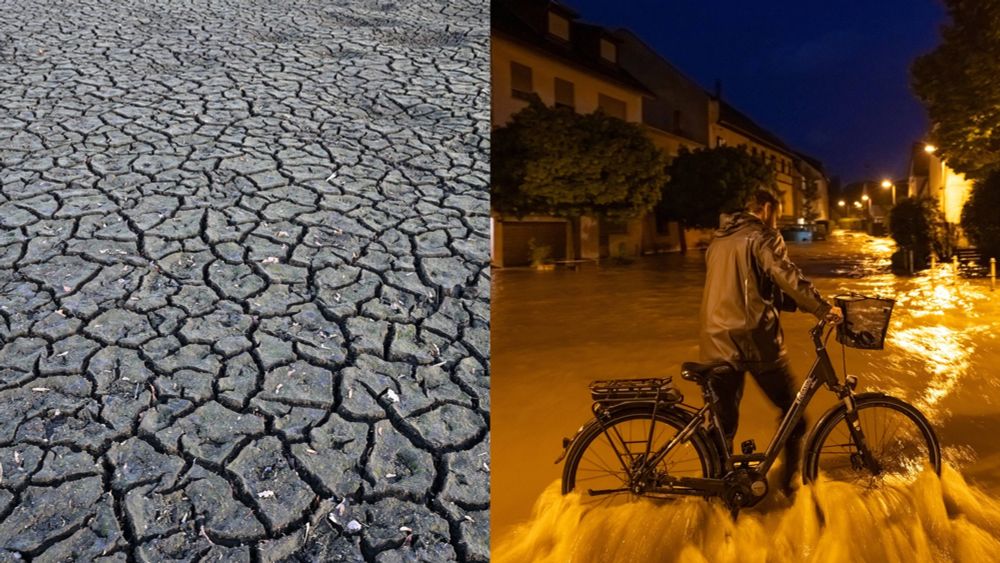
Per salvare il pianeta non è ancora troppo tardi! Italia, Germania
Capua del Potsdam Institute for Climate Impact Research (PIK) nel giorno dello sciopero per il clima indetto da Fridays for Future.
www1.wdr.de
February 24, 2025 at 1:01 PM
Per i nostri follower italiani: la scienziata del PIK @giorgiadc.bsky.social spiega perché non è troppo tardi per stabilizzare il riscaldamento globale. Fino a 2°C le conseguenze sarebbero più o meno prevedibili, ma oltre, ad esempio a 4°C, l’impatto è incerto.
www1.wdr.de/radio/cosmo/...
www1.wdr.de/radio/cosmo/...
I always loved snow, but recently it has become for me a symbol of hope, that all is not lost

February 14, 2025 at 11:24 AM
I always loved snow, but recently it has become for me a symbol of hope, that all is not lost
Reposted by Giorgia Di Capua (Ph.D.)
HISTORIC DAY IN AUSTRALIA
Both South Australia and Queensland had their February hottest day in history with 48.7C at Oodnadatta and 47.5C at Birdsville.
Records are being brutalized allover Oceania and SE Asia.
More updates coming...
Both South Australia and Queensland had their February hottest day in history with 48.7C at Oodnadatta and 47.5C at Birdsville.
Records are being brutalized allover Oceania and SE Asia.
More updates coming...
EXTRAORDINARY HEAT IN AUSTRALIA
More records of February hottest day smashed today
48.7 Oodnadatta
47.9 Coober Pedy
47.5 Birdsville
45.6 Cleve
etc
And also infinite record heat (>700 consecutive days) in INDONESIA with a record high minimum of 27.5C at Merauke (West Papua).
More records tomorrow !
More records of February hottest day smashed today
48.7 Oodnadatta
47.9 Coober Pedy
47.5 Birdsville
45.6 Cleve
etc
And also infinite record heat (>700 consecutive days) in INDONESIA with a record high minimum of 27.5C at Merauke (West Papua).
More records tomorrow !

February 12, 2025 at 9:06 AM
HISTORIC DAY IN AUSTRALIA
Both South Australia and Queensland had their February hottest day in history with 48.7C at Oodnadatta and 47.5C at Birdsville.
Records are being brutalized allover Oceania and SE Asia.
More updates coming...
Both South Australia and Queensland had their February hottest day in history with 48.7C at Oodnadatta and 47.5C at Birdsville.
Records are being brutalized allover Oceania and SE Asia.
More updates coming...
Reposted by Giorgia Di Capua (Ph.D.)
Marine heatwave cause of mass fish deaths and coral bleaching
oceanographicmagazine.com/news/marine-...
oceanographicmagazine.com/news/marine-...

Marine heatwave cause of mass fish deaths and coral bleaching - Oceanographic
A mass fish death in Western Australia has been linked to severe marine heatwaves while coral bleaching intensifies due to climate change.
oceanographicmagazine.com
January 30, 2025 at 7:27 AM
Marine heatwave cause of mass fish deaths and coral bleaching
oceanographicmagazine.com/news/marine-...
oceanographicmagazine.com/news/marine-...
Reposted by Giorgia Di Capua (Ph.D.)
We have lost 8200 km3 of global glacier ice since 1976. The International Year of Glaciers’ Preservation, led by @wmo-global.bsky.social &
@unesconow.bsky.social, aims to raise awareness & advocate action to mitigate the consequences of glacier melt.
Find out more: bit.ly/4h55fda
@unesconow.bsky.social, aims to raise awareness & advocate action to mitigate the consequences of glacier melt.
Find out more: bit.ly/4h55fda
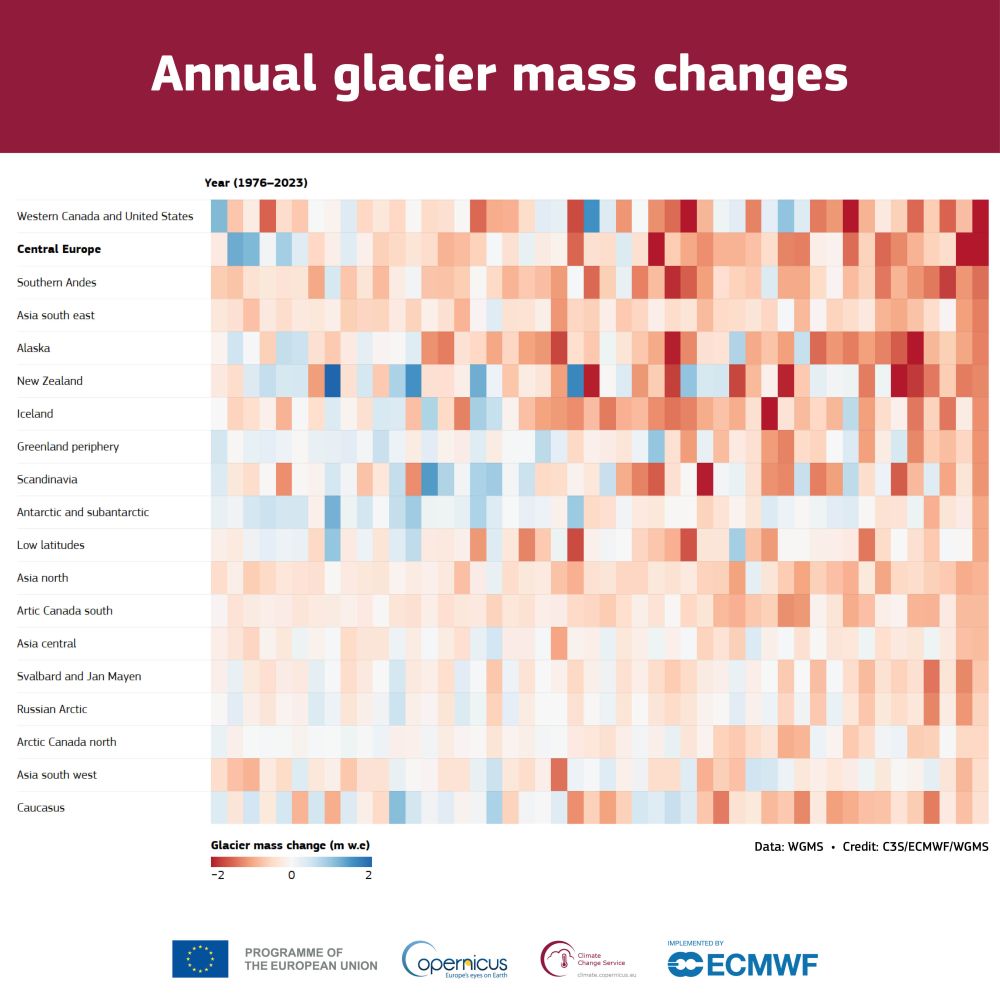
January 23, 2025 at 10:07 AM
We have lost 8200 km3 of global glacier ice since 1976. The International Year of Glaciers’ Preservation, led by @wmo-global.bsky.social &
@unesconow.bsky.social, aims to raise awareness & advocate action to mitigate the consequences of glacier melt.
Find out more: bit.ly/4h55fda
@unesconow.bsky.social, aims to raise awareness & advocate action to mitigate the consequences of glacier melt.
Find out more: bit.ly/4h55fda
Reposted by Giorgia Di Capua (Ph.D.)
"Europe made more electricity from sunshine than coal last year, a report has found, in what analysts called a 'milestone' for the clean energy transition."
We are proud to supply Irish data for @ember-energy.org's "European Electricity Review 2025" ☘️
We are proud to supply Irish data for @ember-energy.org's "European Electricity Review 2025" ☘️
‘Rising star’: Europe made more electricity from solar than coal in 2024

‘Rising star’: Europe made more electricity from solar than coal in 2024
Report reveals solar power generated 11% of Europe’s electricity, surpassing coal at 10%
Europe made more electricity from sunshine than coal last year, a report has found, in what analysts called a “milestone” for the clean energy transition.
Solar…
www.theguardian.com
January 23, 2025 at 10:18 AM
"Europe made more electricity from sunshine than coal last year, a report has found, in what analysts called a 'milestone' for the clean energy transition."
We are proud to supply Irish data for @ember-energy.org's "European Electricity Review 2025" ☘️
We are proud to supply Irish data for @ember-energy.org's "European Electricity Review 2025" ☘️
Reposted by Giorgia Di Capua (Ph.D.)
An extremely dangerous and potentially record-breaking bomb cyclone is just hours away from severely impacting Ireland, especially, and the northern parts of the UK. Storm Éowyn will unfortunately reach its peak intensity right at landfall with wind gusts possibly exceeding 200 km/h (124 mph).
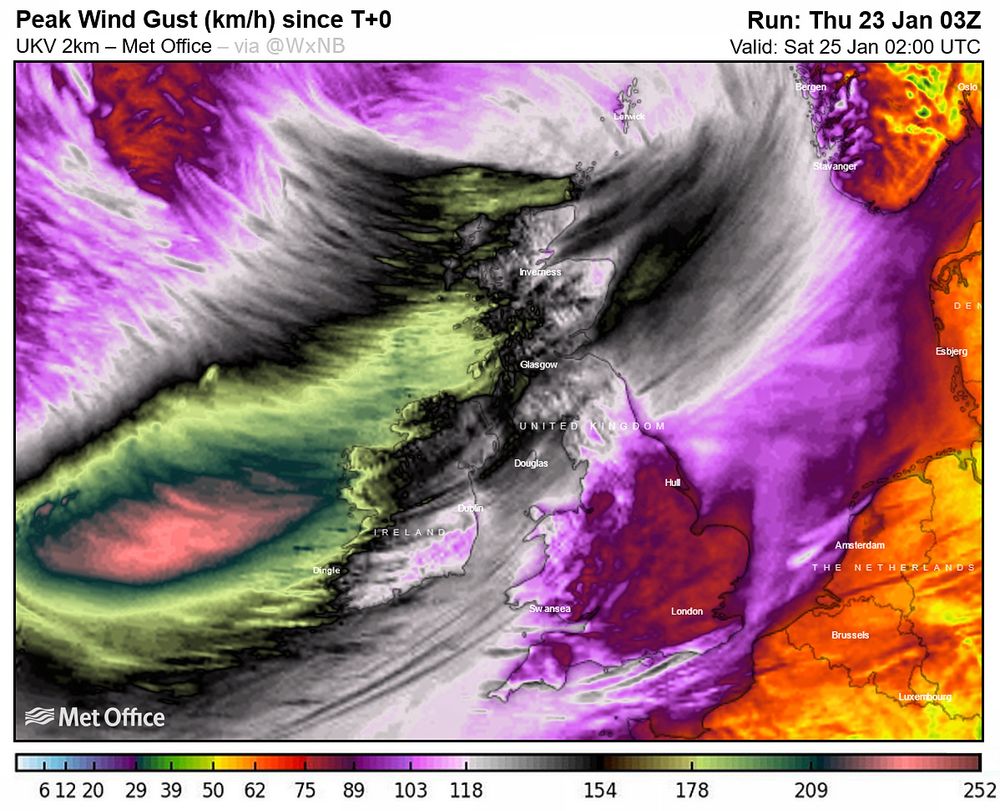
January 23, 2025 at 7:39 AM
An extremely dangerous and potentially record-breaking bomb cyclone is just hours away from severely impacting Ireland, especially, and the northern parts of the UK. Storm Éowyn will unfortunately reach its peak intensity right at landfall with wind gusts possibly exceeding 200 km/h (124 mph).
Reposted by Giorgia Di Capua (Ph.D.)
In 10 days, it is EGU25 submission deadline! 🚨
If your work involves large-scale dynamics and extreme weather/climate events, then consider submitting your abstract to the "Atmospheric Rossby Waves and Jet Dynamics" session! 🌬️〰️🌀
Invited speakers: Peiqiang Xu (IAP) and Talia Tamarin-Brodsky (MIT)!
If your work involves large-scale dynamics and extreme weather/climate events, then consider submitting your abstract to the "Atmospheric Rossby Waves and Jet Dynamics" session! 🌬️〰️🌀
Invited speakers: Peiqiang Xu (IAP) and Talia Tamarin-Brodsky (MIT)!
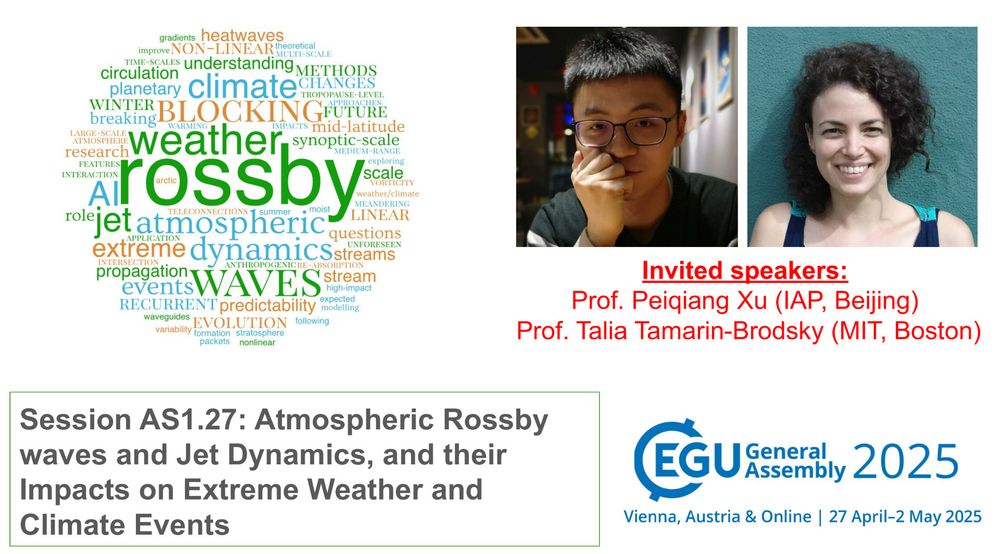
January 6, 2025 at 3:54 PM
In 10 days, it is EGU25 submission deadline! 🚨
If your work involves large-scale dynamics and extreme weather/climate events, then consider submitting your abstract to the "Atmospheric Rossby Waves and Jet Dynamics" session! 🌬️〰️🌀
Invited speakers: Peiqiang Xu (IAP) and Talia Tamarin-Brodsky (MIT)!
If your work involves large-scale dynamics and extreme weather/climate events, then consider submitting your abstract to the "Atmospheric Rossby Waves and Jet Dynamics" session! 🌬️〰️🌀
Invited speakers: Peiqiang Xu (IAP) and Talia Tamarin-Brodsky (MIT)!
This really doesn't help with rainfall extremes
The amount of water in the atmosphere hit a record high in 2024 with 4.9% above the 1991–2020 average. This trend heightens the potential for extreme rainfall events. Explore the Global Climate Highlights 2024 report: bit.ly/40kQpcz
#C3S #GCH2024
#C3S #GCH2024


January 15, 2025 at 9:31 AM
This really doesn't help with rainfall extremes
Reposted by Giorgia Di Capua (Ph.D.)
📈 In 2024, greenhouse gases reached their highest annual levels ever recorded in the atmosphere.
🌁 Carbon dioxide concentrations reached 422 ppm, 2.9 ppm higher than in 2023, & methane 1897 ppb, 3 ppb higher.
▶️ All details, charts and data in the
#GCH2024 report: bit.ly/40kQpcz
🌁 Carbon dioxide concentrations reached 422 ppm, 2.9 ppm higher than in 2023, & methane 1897 ppb, 3 ppb higher.
▶️ All details, charts and data in the
#GCH2024 report: bit.ly/40kQpcz
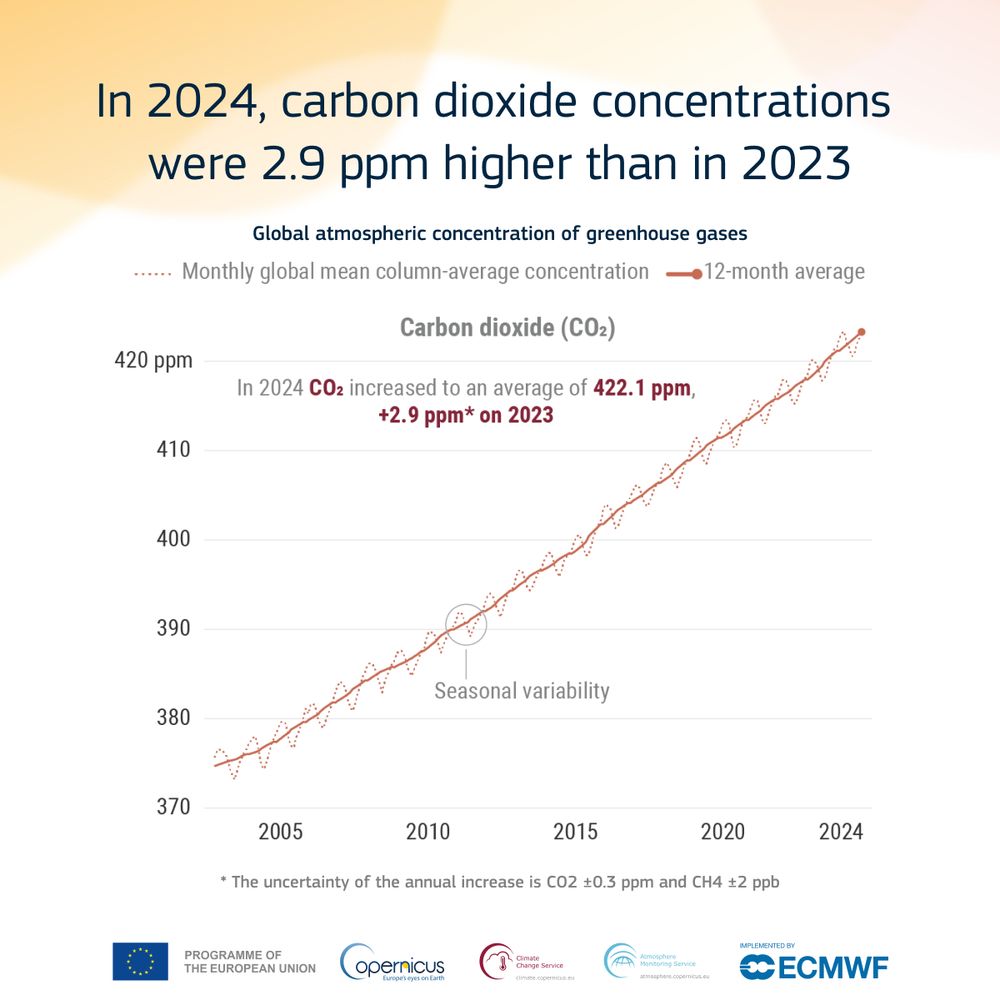
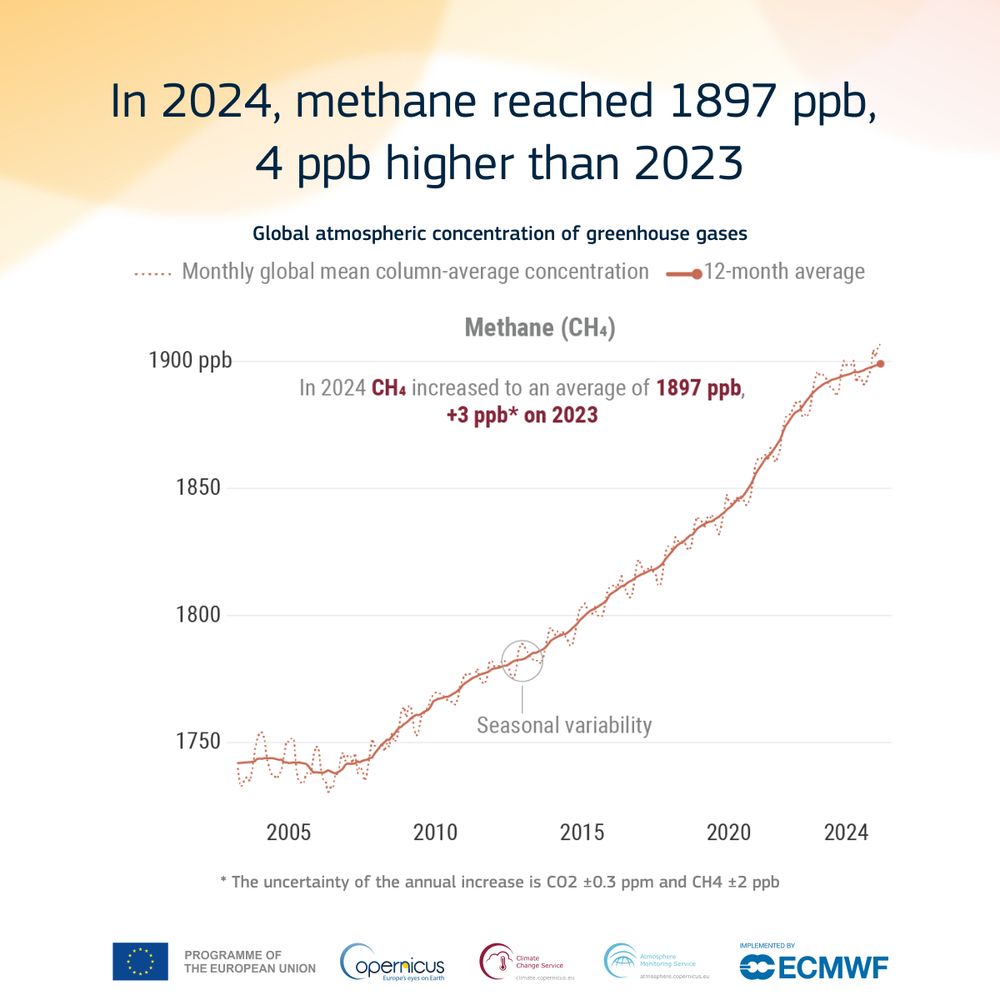
January 14, 2025 at 8:33 AM
📈 In 2024, greenhouse gases reached their highest annual levels ever recorded in the atmosphere.
🌁 Carbon dioxide concentrations reached 422 ppm, 2.9 ppm higher than in 2023, & methane 1897 ppb, 3 ppb higher.
▶️ All details, charts and data in the
#GCH2024 report: bit.ly/40kQpcz
🌁 Carbon dioxide concentrations reached 422 ppm, 2.9 ppm higher than in 2023, & methane 1897 ppb, 3 ppb higher.
▶️ All details, charts and data in the
#GCH2024 report: bit.ly/40kQpcz
Reposted by Giorgia Di Capua (Ph.D.)
#jobsinpotsdam Physicists in Earth system science listen up:
📢applications open for W3 #Professorship in Earth System Dynamics
👩🏫Lead research on ocean, atmosphere & cryosphere dynamics
🥈Joint role with PIK & Potsdam University
▶️ www.uni-potsdam.de/fileadmin/pr...
📢applications open for W3 #Professorship in Earth System Dynamics
👩🏫Lead research on ocean, atmosphere & cryosphere dynamics
🥈Joint role with PIK & Potsdam University
▶️ www.uni-potsdam.de/fileadmin/pr...

December 9, 2024 at 8:59 AM
#jobsinpotsdam Physicists in Earth system science listen up:
📢applications open for W3 #Professorship in Earth System Dynamics
👩🏫Lead research on ocean, atmosphere & cryosphere dynamics
🥈Joint role with PIK & Potsdam University
▶️ www.uni-potsdam.de/fileadmin/pr...
📢applications open for W3 #Professorship in Earth System Dynamics
👩🏫Lead research on ocean, atmosphere & cryosphere dynamics
🥈Joint role with PIK & Potsdam University
▶️ www.uni-potsdam.de/fileadmin/pr...
New paper published just before Christmas 🎄 “Causal relationships and predictability of the summer East Atlantic teleconnection” by Carvalho-Oliveira et al. wcd.copernicus.org/articles/5/1...
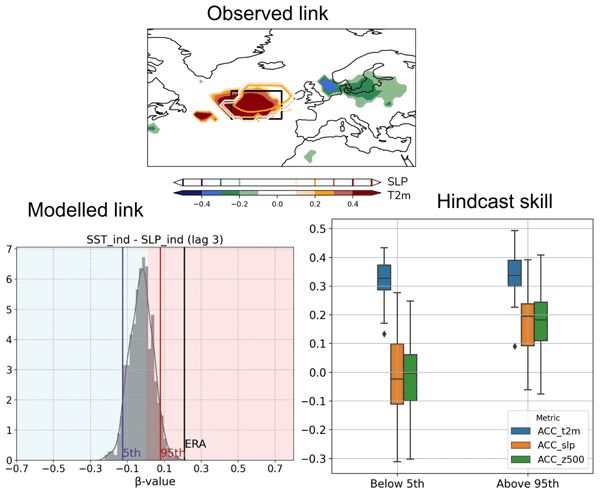
Causal relationships and predictability of the summer East Atlantic teleconnection
Abstract. We apply causal effect networks to evaluate the influence of spring North Atlantic extratropical sea surface temperatures (NA-SSTs) on the summer East Atlantic (EA) pattern seasonal predicta...
wcd.copernicus.org
December 20, 2024 at 9:04 PM
New paper published just before Christmas 🎄 “Causal relationships and predictability of the summer East Atlantic teleconnection” by Carvalho-Oliveira et al. wcd.copernicus.org/articles/5/1...
Understanding the mechanisms and atmospheric drivers that contribute to hot and dry compound extremes in Europe it’s a challenge that here we tackle with a causal discovery method. Great experience for me personally to work with this talented team of early career scientists
More compounding hot and dry events in Europe—not only stronger driver, but also amplified causal link strength!
It’s such a pleasant journey starting from Como summer school back to 2022. Many thanks to all my excellent coauthors and dear friends
www.nature.com/articles/s43...
It’s such a pleasant journey starting from Como summer school back to 2022. Many thanks to all my excellent coauthors and dear friends
www.nature.com/articles/s43...

Historical changes in the Causal Effect Networks of compound hot and dry extremes in central Europe - Communications Earth & Environment
Central Europe experiences hot and dry extreme events due to atmospheric and surface anomalies, with dry soil’s impact on temperature increasing by up to 67% and atmospheric drivers’ impact on soil mo...
www.nature.com
December 12, 2024 at 3:24 PM
Understanding the mechanisms and atmospheric drivers that contribute to hot and dry compound extremes in Europe it’s a challenge that here we tackle with a causal discovery method. Great experience for me personally to work with this talented team of early career scientists
#AGU24 For the first session of the day, my colleague will kindly present for me in "Heat Waves Behind the Scenes: Drivers, Mechanisms, Changes, and Impacts - A11E"
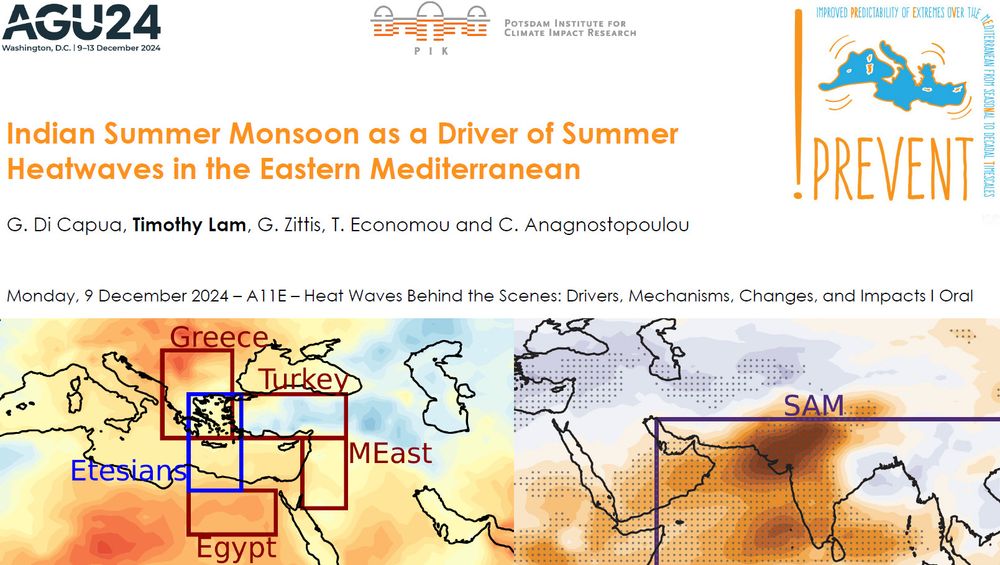
December 9, 2024 at 1:03 PM
#AGU24 For the first session of the day, my colleague will kindly present for me in "Heat Waves Behind the Scenes: Drivers, Mechanisms, Changes, and Impacts - A11E"
Just in time
🌍🌌 AGU is thrilled to join Bluesky!
We’re here to share exciting discoveries, spotlight incredible scientists, and connect with YOU in this vibrant community.
Follow along as we explore how Earth and space sciences make the world a better place. 🌟
We’re here to share exciting discoveries, spotlight incredible scientists, and connect with YOU in this vibrant community.
Follow along as we explore how Earth and space sciences make the world a better place. 🌟
December 6, 2024 at 4:03 PM
Just in time
Pianura padana standing out as usual
Winter is typically the most polluted season of the year. Increased fuel combustion for heating and transport, along with cold, dense air, can trigger spikes in many air pollutants.
To find out more, read our article: atmosphere.copernicus.eu/cool-dry-con...
To find out more, read our article: atmosphere.copernicus.eu/cool-dry-con...
December 6, 2024 at 3:41 PM
Pianura padana standing out as usual
Reposted by Giorgia Di Capua (Ph.D.)
I have a new fully funded PhD available, open to international students on "Monsoons at the kilometre scale". @ncas-uk.bsky.social University of Reading with CASE support from the Met Office and working with Dr Richard W Jones www.findaphd.com/phds/project... #monsoon #highres
December 1, 2024 at 10:47 AM
I have a new fully funded PhD available, open to international students on "Monsoons at the kilometre scale". @ncas-uk.bsky.social University of Reading with CASE support from the Met Office and working with Dr Richard W Jones www.findaphd.com/phds/project... #monsoon #highres
Don’t miss Yinglin’s #AGU24 talk on nonlinear mechanisms responsabile for heatwaves at global scale 🔥🌞 having seen the dry run, I can warmly recommend
Excited to present our latest research on the nonlinear interactive processes driving the most extreme heatwaves at #AGU! Join us for the talk on Monday morning, or feel free to connect anytime during the week if you can’t make it.
@pik-potsdam.bsky.social @iiasa.ac.at
@columbiaclimate.bsky.social
@pik-potsdam.bsky.social @iiasa.ac.at
@columbiaclimate.bsky.social

December 5, 2024 at 6:42 PM
Don’t miss Yinglin’s #AGU24 talk on nonlinear mechanisms responsabile for heatwaves at global scale 🔥🌞 having seen the dry run, I can warmly recommend
Reposted by Giorgia Di Capua (Ph.D.)
North and South America saw the most wildfire activity in 2024 according to #CopernicusAtmosphere data. Europe had a relatively average season except for Portugal, some countries of Eastern Europe and the Balkans.
All details in our latest article: atmosphere.copernicus.eu/cams-global-...
All details in our latest article: atmosphere.copernicus.eu/cams-global-...
December 5, 2024 at 10:15 AM
North and South America saw the most wildfire activity in 2024 according to #CopernicusAtmosphere data. Europe had a relatively average season except for Portugal, some countries of Eastern Europe and the Balkans.
All details in our latest article: atmosphere.copernicus.eu/cams-global-...
All details in our latest article: atmosphere.copernicus.eu/cams-global-...
Reposted by Giorgia Di Capua (Ph.D.)
'Global emergence of regional heatwave hotspots outpaces climate model simulations'
our new paper in @pnas.org with S. Bartusek, R. Seager. J. Schellnhuber and M. Ting investigating the tail behaviour of extreme heatwave trends.
@iiasa.ac.at @columbiaclimate.bsky.social @lamontearth.bsky.social
our new paper in @pnas.org with S. Bartusek, R. Seager. J. Schellnhuber and M. Ting investigating the tail behaviour of extreme heatwave trends.
@iiasa.ac.at @columbiaclimate.bsky.social @lamontearth.bsky.social
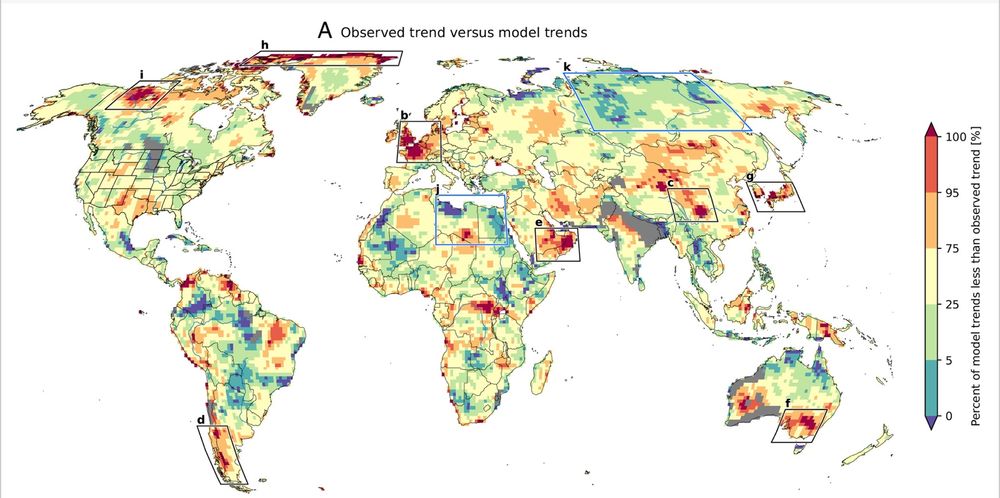
November 26, 2024 at 6:51 PM
'Global emergence of regional heatwave hotspots outpaces climate model simulations'
our new paper in @pnas.org with S. Bartusek, R. Seager. J. Schellnhuber and M. Ting investigating the tail behaviour of extreme heatwave trends.
@iiasa.ac.at @columbiaclimate.bsky.social @lamontearth.bsky.social
our new paper in @pnas.org with S. Bartusek, R. Seager. J. Schellnhuber and M. Ting investigating the tail behaviour of extreme heatwave trends.
@iiasa.ac.at @columbiaclimate.bsky.social @lamontearth.bsky.social
Reposted by Giorgia Di Capua (Ph.D.)
☀️How do heatwaves differ in their physical mechanisms? Our latest study identifies four distinct types of heatwaves, each driven by different mechanisms and exhibiting unique impacts on ecosystems and historical trends. www.nature.com/articles/s43...
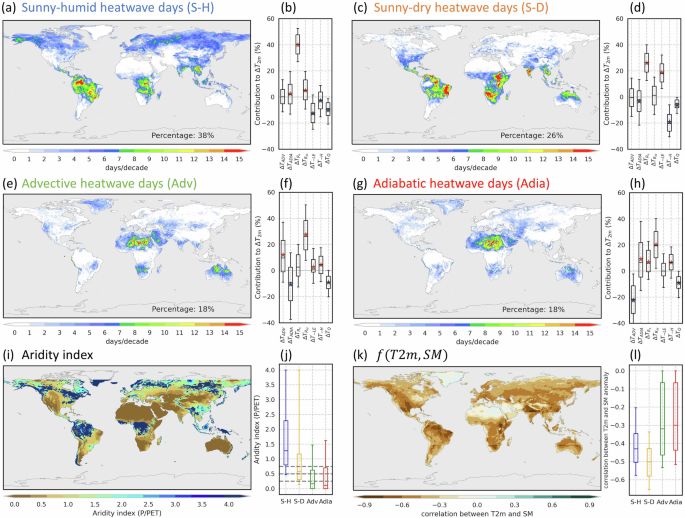
Characterizing heatwaves based on land surface energy budget - Communications Earth & Environment
Global heatwave days can be classified into sunny-humid, sunny-dry, advective, and adiabatic types, with sunny-dry days showing the most widespread increase from 2000 to 2020, causing carbon uptake re...
www.nature.com
December 4, 2024 at 6:43 PM
☀️How do heatwaves differ in their physical mechanisms? Our latest study identifies four distinct types of heatwaves, each driven by different mechanisms and exhibiting unique impacts on ecosystems and historical trends. www.nature.com/articles/s43...
Reposted by Giorgia Di Capua (Ph.D.)
There is a small chance that the first sea ice free day in the Arctic Ocean could occur before 2030 if the right sequence of weather events occur, based on #CMIP6 models. rdcu.be/d2gBK www.colorado.edu/today/2024/1... @clnhz.bsky.social @naturvetenskap.bsky.social @colorado.edu @instaar.bsky.social
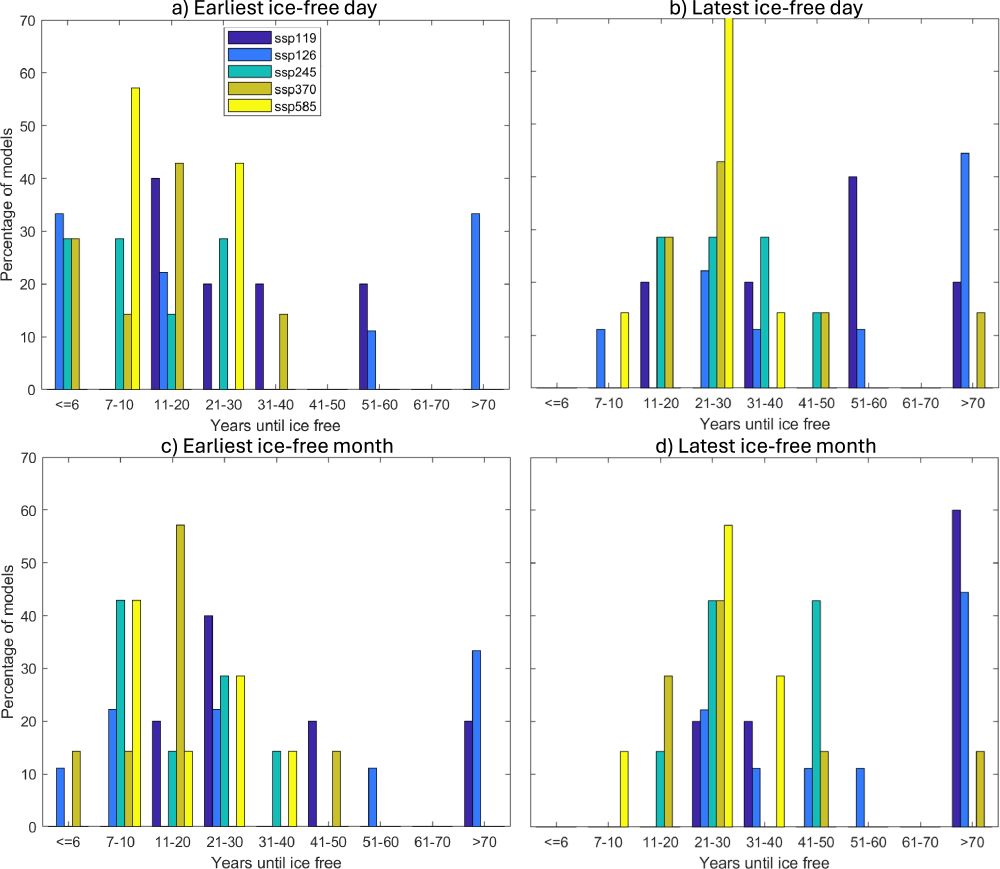
The first ice-free day in the Arctic Ocean could occur before 2030
Nature Communications - The first day with no sea ice in the Arctic will be a visible sign of climate change. This work reveals that this could occur before 2030 already and becomes more likely as...
nam10.safelinks.protection.outlook.com
December 3, 2024 at 1:48 PM
There is a small chance that the first sea ice free day in the Arctic Ocean could occur before 2030 if the right sequence of weather events occur, based on #CMIP6 models. rdcu.be/d2gBK www.colorado.edu/today/2024/1... @clnhz.bsky.social @naturvetenskap.bsky.social @colorado.edu @instaar.bsky.social
Reposted by Giorgia Di Capua (Ph.D.)
Causal discovery loves conditional independence tests -- here's our CI test of the month: ParCorrWLS can deal with heteroskedastic data! Tigramite tutorial: github.com/jakobrunge/t... NeurIPS paper: proceedings.neurips.cc/paper_files/...

tigramite/tutorials/causal_discovery/tigramite_tutorial_heteroskedastic_ParCorrWLS.ipynb at master · jakobrunge/tigramite
Tigramite is a python package for causal inference with a focus on time series data. The Tigramite documentation is at - jakobrunge/tigramite
github.com
November 29, 2024 at 10:22 AM
Causal discovery loves conditional independence tests -- here's our CI test of the month: ParCorrWLS can deal with heteroskedastic data! Tigramite tutorial: github.com/jakobrunge/t... NeurIPS paper: proceedings.neurips.cc/paper_files/...

